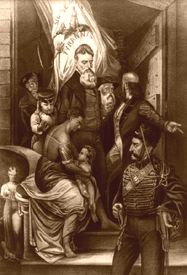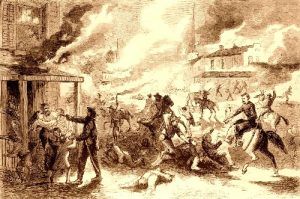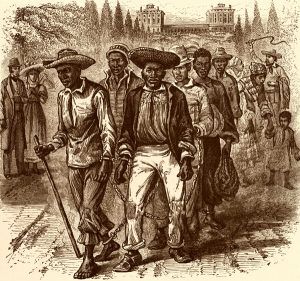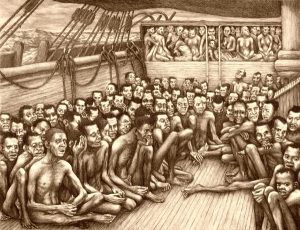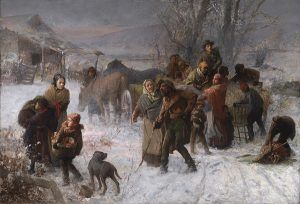While some of these terms may seem self-explanatory, the words were often used differently in the mid-1800s when it came to the institution of slavery in the United States. Other terms are so rarely heard today that many modern readers have never heard them. Other items that provide brief descriptions and links to more information are also included.
~~
13th Amendment – This Amendment to the U.S. Constitution formally abolished slavery in the United States on December 6, 1865.
Abolitionist – This term is different from an anti-slavery activist. An abolitionist took a political position and was likely politically active. The abolitionist may act on his/her anti-slavery principles by helping individuals escape from slavery, joining Anti-Slavery groups, or, in some cases, taking their position even further, such as the radical John Brown, who fought in what has become known as Bleeding Kansas before the Civil War.
African Diaspora – The dispersal of Africans in the New World.
Anti-slavery Activist – This refers to a person who is morally or politically opposed to slavery. This person might, on occasion, help a freedom seeker. The activist might be a Southerner or could be the spouse or child of a slaveholder. The activist might come from any ethnic, political, or religious group.
Bleeding Kansas – Also referred to as the Kansas-Missouri Border War, this was a series of violent political confrontations involving anti-slavery Free-Staters and pro-slavery “Border Ruffian” elements in Kansas Territory and Missouri between 1854 and 1861. At the heart of the conflict was whether Kansas would enter the Union as a free or slave state. The term “Bleeding Kansas” was coined by Horace Greeley of the New York Tribune; the events it encompasses directly presaged the Civil War.
Bondsperson – A person held in servitude as human property to another. This alternate term for “slave” was often used because “bondsman” suggests a law-imposed condition.
Chattel – Using this term for an enslaved African American, a human being is equated with livestock, or furniture or other tangible, portable personal property. “Chattel” could be left in a will or sold or transferred without the enslaved person’s permission.
Coffle – A group of enslaved individuals transported together for sale.
Conductor – An individual who escorted or guided freedom seekers between Underground Railroad stations or safe houses. A Conductor need not have been a member of an organized section of the Underground Railroad, only someone who provided an element of guidance to the freedom seeker.
Contrabands – Slaves who had escaped across Union lines or who had been captured by Union forces and were not returned to their owners. In May 1861, Union General Benjamin Butler refused to comply with the Fugitive Slave Act of 1850, which required the return of escaped slaves to their owners. Instead, he labeled the fugitive slaves, whom the Confederacy considered property, “contraband of war” (i.e., seized property) if their masters would not pledge loyalty to the Union. The federal government later expanded the categories of slaves not to be returned or who were declared free. The term “contraband” continued to be used throughout the war for former slaves.
Copperhead – See Peace Democrat
Emancipation – Freeing slaves in law or fact. Emancipation may or may not include the abolition of the institution of slavery. During the Civil War, emancipation was often limited to certain types of slaves or particular areas.
Fugitive – A common term in the eighteenth and nineteenth centuries that is still used today to describe the freedom seeker. The term was attached to the various Fugitive Slave Laws passed by the U.S. Congress and suggested that the “fugitive” was a criminal to escape bondage. The language employed was key in preserving the view that the law was on the side of slaveholding society — which it was — while reinforcing the view that the “fugitive” was incapable of acting responsibly in a society governed by the rule of law.
Gin – Separate the seeds from the fiber in cotton.
Gradual Emancipation – Ending slavery over a period of years, such as freeing slaves when they reached 21 years of age or after a specified period of years.
Manumit/Manumission – This word refers to freeing an individual or group of enslaved African Americans by will, purchase, legal petition, or legislation. Enslaved African Americans would save up from jobs for hire or sale of goods for their manumission. Slave owners would free individuals as a favor or pick favored people to free at the slaveholder’s death. Enslaved people were willing to take the risk of going to court to seek their freedom. Some people distinguish “manumission” from “emancipation,” using “manumission” to refer to only one individual at a time.
Maroon – Runaway slaves who escaped. This term also refers to a community or small group of escaped slaves who lived in a remote place (like a swamp or the mountains). These settlements often actively assisted other freedom seekers. The Everglades in Florida and the Great Dismal Swamp in Virginia were sites of maroon communities.
Operative – An accomplice who helps an escaped slave. He or she may help arrange an escape, serve as a “conductor,” or otherwise aid in the escape. If the freedom seeker was caught, he or she might provide a lawyer or money for fines and bail and/or arrange a purchase from the slaveholder.
Middle Passage – The name Africans gave to the trip across the Atlantic Ocean to New World enslavement.
Peace Democrat – A member of the Democratic Party who supported a ceasefire in the Civil War and a negotiated settlement with the Confederacy. The negative term “Copperhead” (after the poisonous snake) was applied to both Peace Democrats and Confederate sympathizers in the North, even though the two groups were usually distinct.
Personal Liberty Laws – Drafted in direct response to the Fugitive Slave Acts of 1793 and 1850, several states, including Connecticut, Massachusetts, Michigan, Maine, New Hampshire, Ohio, Wisconsin, Vermont, and others, implemented these laws in an attempt to make the legal system fairer for all people and to ensure the safety of freedmen and escaped slaves.
Many of these laws were enacted to avoid more feuding between the northern and southern states. However, New Jersey and California gave direct official sanction or assistance to the forced return of fugitive slaves. Indiana, Illinois, and Oregon did so indirectly by prohibiting the entrance within their borders of African-Americans, either slave or free.
Radical Democracy – A short-lived political party that existed in 1864, composed of a small group of Radical Republicans and War Democrats.
Radical Republican – A member of the Republican Party who supported Reconstruction policies that were more comprehensive and punitive than those advocated by moderate or conservative politicians. Some radicals, for example, argued that the former Confederacy should be treated as conquered territory for which Congress would dictate terms for Reconstruction, such as the confiscation of Confederate property, disfranchisement of former Confederates, and voting rights for black men. Congressional Reconstruction was a compromise between radical and moderate Republicans.
Reconstruction – The policies related to incorporating the former Confederate states back into full and equal participation in the federal union of the United States.
Redemption – Referred to those enslaved African Americans who were purchased by others to free them. The idea is that the people were “redeemed” from slavery. Some freedom seekers did not want their freedom, a God-given right if it had to be bought. They preferred to risk recapture.
Secession – The act or process of withdrawing allegiance to and participation within a sovereign political jurisdiction. In 1860-1861, eleven Southern slave states announced that they had seceded from the United States, and then formed the Confederate States of America.
Slave/Enslaved – The historical term for human beings held in bondage and forced to perform labor or services against their will under the threat of physical mistreatment or death.
Slave Patrol – Formed by state militias and county courts or, sometimes by plantation owners themselves, these groups were responsible for apprehending African-Americans who were involved in crimes, keeping slaves “in their place”, stopping escapes, and capturing freedom seekers. Members came from all social classes. Mounted on horses, they were often armed with guns, whips, and clubs, and not afraid to be brutal. They would stop blacks and demand “passes” or other forms of identification to demonstrate that the African Americans weren’t escapees. Slave patrols had the right to search slave quarters. Some called them “patrollers” or “patty rollers.”
Station – The Underground Railroad “station” provided a haven for traveling freedom seekers, was secured by the stationmaster, and took many forms. Stations might be basements, cabins, homes, barns or caves, or any other site that provided an element of security while giving the freedom seeker an opportunity for rest and provisions.
Stationmaster – Refers to an individual who provided shelter or a hiding place to freedom seekers on the Underground Railroad. Shelter need not be in the dwelling of the stationmaster, yet refuge of any sort was the responsibility of the stationmaster. The stationmaster served as a clearinghouse for information regarding safe routes and nearby pursuit of freedom seekers and coordinated with conductors and other station managers to provide safe passage for freedom seekers upon departure from that station.
Term Slavery – Regarding 18th and 19th-century slavery, this limited the time that an individual was enslaved, meaning that they were not enslaved for life but only for a set number of years. At the end of the set term, the individual was to be freed. If sold, the restricted number of years of slavery was to be honored. Unfortunately, the distinction between “term” and “slave for life” was not always respected.
War Democrat – A member of the Democratic Party who supported the Union war effort against the Confederacy. Most War Democrats remained affiliated with the Democratic Party during the Civil War. Still, a few, such as Andrew Johnson, formally joined the Republican Party in 1864 under the National Union banner.
War Powers – Extraordinary governing authority during a national crisis that may be exercised by the commander-in-chief, who under the United States Constitution is the president.
Compiled and edited by Kathy Weiser/Legends of America, updated March 2024.
Also See:
African American History in the United States

